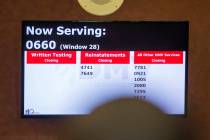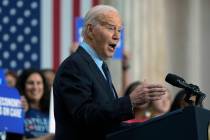Clearing the path for Nevada’s entrepreneurs
William P. Weidner, chairman and CEO of Global Gaming Asset Management and former president of Las Vegas Sands Corp., is a member of Nevada's recently created Board of Economic Development. And he's concerned that current efforts at economic diversification place too much emphasis on bureaucrats picking winners and not enough on simply untying the hands of Nevada's entrepreneurs.
"Centralized actions designed to produce a bureaucratic conception of 'economic diversification' will never build a solid foundation for sustainable economic growth," Mr. Weidner writes in his introduction of a new report from the Nevada Policy Research Institute, dubbed "The Path to Sustainable Prosperity: Removing the Obstacles Facing Nevada's Entrepreneurs."
Nevada has already witnessed "an illusory boom and subsequent bust" resulting from the top-down efforts of government, adds Mr. Weidner, who serves on NPRI's board, referring to manipulations of the housing and credit markets out of Washington. In contrast, "Only an economy that is organically constructed from the bottom-up actions of private entrepreneurs, responding to the price signals in the marketplace, is capable of delivering sustainable growth," he argues.
Despite a widely held belief that Nevada is a business-friendly state, the new NPRI report argues Nevada is actually among the states most hostile to entrepreneurship, because - while per-capita tax levels are near the national median - the state suffers from some of the nation's harshest licensing and filing requirements, labor-market strictures and overall regulations.
Nevada could become more business-friendly by eliminating state business subsidies, reducing or eliminating state and local licensing fees and filing requirements, easing labor restrictions and streamlining its regulatory structure, the report recommends.
Mr. Weidner and the NPRI scholars have a point. While there's nothing wrong with holding out open arms to investors who want to locate and expand here with ventures in such targeted fields as tourism, gaming and entertainment, health and medical services, and information technology, the problem arises when "less favored" industries face a heavier tax load in order to subsidize pet projects.
We need look no further than the 2011 bankruptcy of California-based solar-panel manufacturer Solyndra for an example of citizens forcibly deprived of financial resources they otherwise could have used on their own higher priorities, in order to subsidize a failing venture backed by insiders with political clout, note Geoffrey Lawrence and Cameron Belt, authors of the NPRI report.
Specifically, the report recommends that Nevada lawmakers eliminate the Modified Business Tax; eliminate occupational licensing requirements for trades that pose little risk of physical harm; reduce business license fees and restrictions on employing labor; build on Gov. Brian Sandoval's effort to streamline the state regulatory structure; and "eliminate or drastically simplify local zoning ordinances and regulations."
Lawmakers frequently complain they can't find the resources to "do everything we're asked to do." That should make them more open-minded to responsible analysts advising that, in some cases, the road to prosperity lies in government doing less.

















